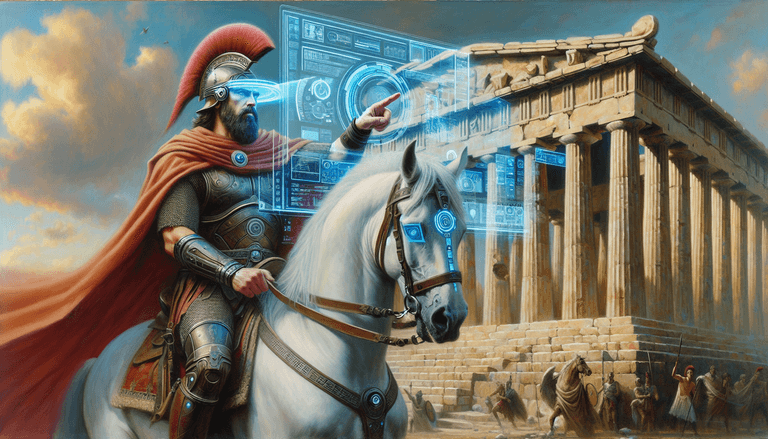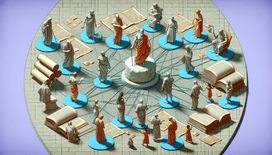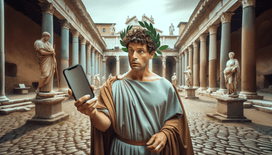Once upon a time in the vast stretches of the ancient world, there roamed a lad not unlike your regular military prodigy – ambitious, visionary, perhaps even a tad on the obsidian side of overconfident. His name? Alexander the Great, or Alex for those on more familiar GIF-sharing terms. But what if this unstoppable force of ancient history had in his cohort the wizardry of augmented reality (AR)?
Yes, dear reader, imagine if young Alex could swap his cumbersome scrolls for dynamic AR holograms. His sweeping conquests might not have only been fuelled by ingenious strategies and relentless armies but perhaps a little digital wizardry. Let’s wander down this imaginative path of conquests, conundrums, and quite possibly, a couple of digital dragons sprinkled along the way.
Setting the Scene
Picture the formidable sight of Alexander atop Bucephalus, his trusty steed, squinting at the sun-kissed horizon. But what's this? Instead of staring into the void of yesteryears, he’s now peering into a world augmented beyond ordinary limits.
With a subtle gesture (read: dramatic royal finger wag), an AR interface flickers into life, projected before his eyes - perhaps manifesting in the shape of a gilded helmet with virtual visors. Contour maps of the terrain, weather data, and even the enemy’s grocery lists would swirl in a translucent dance. One can only imagine Aristotle clutching his laurels in shock!
AR in Battle Tactics
The Macedonian phalanx, an absolute wall of chaos waiting to unfurl meticulously into the battlefield, was quite the fearsome sight. But chuck in a bit of AR, and you've got a psychological thriller. With real-time overlays showcasing optimal maneuvers, the soldiers could experience a tactical choreography even beyond the mischief of a Hollywood blockbuster.
What would the repercussions have been? For starters, there would be no more scrabbling through papyrus before ambushes, or nuanced debates over the precise inclination of a tent peg to ensure shadow falls ominously over their sturgeon supplies. AR would ensure split-second strategic decisions, efficiently dispatch tropes of confusion, and pray tell, perhaps even conserve a few Macedonian bunions from tread conflict.
Diplomatic Delights & Digital Diversions
Outside the fraught chaos of battle, Alexander had a mosaic of empires to charm into submission. Here's where augmented reality becomes the unexpected social lubricant. Picture this: an opulent banquet in Persepolis, with AR-enhanced storytelling delighting royals and diplomats alike. Virtual tableaux of Greek myths unfurl into three-dimensional pageants, leaving those Persians agog in Painted Blue rooms.
And of course, AR entertainment for forging alliances wasn't only about wowing the masses with mythological PowerPoints. Talented artisans and architects could use AR to plan marvellous constructions without the constraints of poor imaginations and shaky plans – making Alexander less Great, and more Magnificently Magnified in finery as intangible ideas come to projected life.
Amongst the Mythical Mechanics
Now, let's not forget that the ancients held a fair penchant for a mythology mash-up, and modern technology could very well be seen in perplexing ways. Imagine if Alexander had decided to incorporate AR-enhanced mythological beasts as part of his grand narrative tapestry. A digital dragon yonder, hovering mystically over faraway hills, might just be the motivator of his soldiers’ nightly campfire musings or those toasts raised post-skirmish.
No longer just fighting for territory, soldiers would become uncanny handlers of Augmented Arachne’s web-spinning threats or battling a virtual Cerberus guarding speakeasies of secret Spartan spaces.
A Legacy Amongst Lines of Code
At the crux of it all, what truly matters is how such a historic powerhouse of change would have reconciled with modern digital prowess. How would Alexander’s story resonate through the annals of time if realities had been a touch more pixelated?
Would he have been deemed a master tactician or a mere conjurer of AR illusions? Perhaps the ancient theatres would sport curtains figuratively lifted by holographic directors; perhaps, dare I say, a clone Orpheus would serenade. One thing's for sure: conquering connectivity would have meant more than just annexing terra firma.
And that, my fellow time-travel enthusiasts, is where we leave Alexander, an eternal tapestry with threads now woven through bits and bytes. A historic figure reborn through a digital looking glass, where conquests are conquered anew in a boundless virtual arena.







